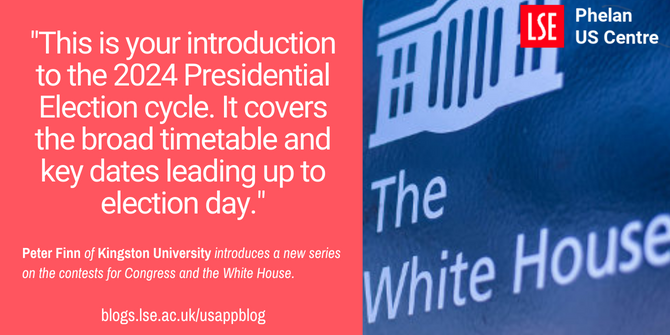 In November 2024, Americans will vote to choose their next President as well as members of the US House and Senate. In this opening article in our new series, ‘The 2024 Elections’, Peter Finn gives an overview of the state races to expect year, the 2024 primary calendar and nominating conventions, congressional elections, and the race for the White House.
In November 2024, Americans will vote to choose their next President as well as members of the US House and Senate. In this opening article in our new series, ‘The 2024 Elections’, Peter Finn gives an overview of the state races to expect year, the 2024 primary calendar and nominating conventions, congressional elections, and the race for the White House.
- ‘This article is part ‘The 2024 Elections’ series curated by Peter Finn (Kingston University). Ahead of the 2024 election, this series is exploring the US elections at the state and national level. If you are interested in contributing to the series contact Peter Finn (p.finn@kingston.ac.uk).’
While there are 18 months remaining until the 2024 US presidential election, many candidates have already declared their intention to run, including the incumbent President, Joe Biden, and the previous resident of the White House, Donald Trump. With that in mind, this is the first in a comment series exploring US elections in the lead up to 2024. The series will explore US federal and state elections, building on four prior series’ I have, along with LSE USAPP Managing Editor Chris Gilson, been involved with.
This is your introduction to the 2024 Presidential Election cycle. It covers the broad timetable and key dates leading up to election day. I also highlight some upcoming off year elections, discuss the 2024 primary season, and note the dates and places where the Democratic Party and Republican parties will nominate their presidential candidates.
The elections before election year – 2023 contests
The bulk of US elections happen in even years, with presidential elections every four years (I.e., 2012, 2016, 2020). Congressional and other elections in even years between presidential contests (i.e., 2010, 2014, 2022) are known as Midterms. Elections scheduled for odd years are known as off year elections. In November this year, there are off year gubernatorial elections scheduled in Kentucky, Louisiana, and Mississippi.
Kentucky
In the Bluegrass state, a crowded field of a dozen candidates will contest a Republican Party primary May 16 to see who will take on Democratic incumbent Governor Andy Beshear on November 7. The race is gaining national attention as Beshear has strong approval ratings, despite Trump receiving 62 percent of the vote in Kentucky in 2020.
Louisiana
In the Pelican state, John Bel Edwards, the Democratic Governor since 2016, is term limited, and the filing deadline for candidates is August 10. The state (as opposed to a party specific) primary is October 14. All candidates, regardless of party affiliation or independent status, will run in the primary. If any candidate receives over 50 percent of the vote in the primary, they will win the election. However, if this does not occur the top two candidates, irrespective of party affiliation will face each other on November 18. As in Kentucky, Louisiana voted heavily in favour of Trump in 2020 despite having a Democratic governor.
Mississippi
In the Magnolia state, Governor Republican Tate Reeves is running for re-election. There are primaries (and a primary run-off) scheduled for August. However, Northern District Public Service Commissioner Brandon Presley became the presumptive nominee of the Democratic Party in mid-February when the Mississippi Democratic Party Executive Committee ruled that two other candidates had failed to file financial disclosures required by state law (something at least one candidate has contested).
2024 Primaries and Conventions
Not long after those elected in November 2023 take office early next year (or begin new terms following re-election), the 2024 primary season will formally begin. Within the Republican Party there is relative harmony about how this will occur, with the Republican National Committee having voted to maintain the same primary calendar for 2024 as it ran in 2020. As such, the Iowa Caucus in early February will be followed by the New Hampshire Primary, followed by Nevada and South Carolina prior to Super Tuesday in early March.

“White House Sign” (Public Domain) by Matt Popovich
As I explored in an earlier post, however, there is no such agreement in the Democratic Party. According to the national Democratic Party, in 2024 the early Democratic Primary states (sometimes referred to as ‘carve outs’) will be South Carolina (February 3), New Hampshire and Nevada (February 6), Georgia (February 13), and Michigan (February 27), with sanctions threatened for states that do not conform to this timetable. This timetable is a change from 2020, when the carve outs were (reflecting the Republican Party in 2024) Iowa, New Hampshire, Nevada, and South Carolina. Reflecting these tensions, the earlier post noted above drew a weighty riposte from the Chairman of the Democratic Party in New Hampshire (or at least someone purporting to be them) stating: ‘To be abundantly clear, New Hampshire will host the First in the Nation Presidential Primary for both parties’. A statement that clearly conflicts with the national Democratic Party timetable.
Given Biden is the most likely Democratic Party candidate, the impact of the proposed changes may not be felt until 2028, when there will almost certainly be a competitive primary for the Democratic presidential nomination.
The Republican Party nomination convention will be held in Milwaukee, Wisconsin, 15-18 July. With the Democratic Party nomination convention will be held in Chicago, Illinois, 19-22 August.
2024 Presidential Election
This General Election will be held on Tuesday, November 5, 2024. As of May 2023, the headline presidential race appears most likely to be a rerun of 2020, with incumbent Biden facing former president Trump. However, there are also thousands of other elections occurring on the same day at federal, state and territory, and local level.
In the US Senate, races of note include Arizona, Ohio, and West Virginia. In Arizona, formerly Democrat but now Independent Krysten Sinema will likely face tough challenges from both Democratic and Republican candidates. Whilst in Ohio, Democrat Sherrod Brown, who has held a Senate seat since 2007, faces a challenge to retain his seat after Trump won the state by 8 percent in 2020. Finally, in West Virginia Democrat Joe Manchin, scourge of many of his party for being on the right of his party, would face a struggle from the opposite end of the partisan spectrum to retain his seats in a state won by Trump in 2020 by just under 39 percent if he seeks re-election.
New leader of the House Democratic Caucus Hakeem Jeffries, meanwhile, will be looking to overturn the slim Republican majority gained at the 2022 midterms, and potentially become the Democratic House Speaker. Ahead of these elections, however, expect familiar fights over evergreen issues such as the debt ceiling, reproductive rights, and judicial appointments, and, if the last few years are anything to go by, some unexpected challenges arising from events within the US and externally.
Please read our comments policy before commenting.
Note: This article gives the views of the author, and not the position of USAPP – American Politics and Policy, nor the London School of Economics.
Shortened URL for this post: https://bit.ly/3M3LYKH






